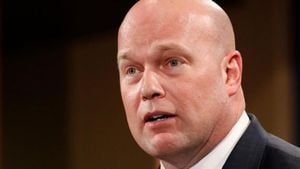Recent developments have brought the long-standing tensions between Israel and Hezbollah to the forefront, with various talks aimed at achieving a ceasefire becoming increasingly significant. U.S. special envoy Amos Hochstein, who visited Lebanon recently, has reported "positive progress" on ceasefire negotiations, speaking to officials from both Israel and Hezbollah. Hochstein's comments followed Hezbollah's tentative agreement to the U.S. ceasefire proposal, signaling potential movement away from a conflict that's left thousands dead and many more displaced.
The conflict between these two parties intensified dramatically after Hezbollah launched attacks on Israel shortly after the outbreak of hostilities between Israel and Hamas on October 8, 2023. Following the onset of the conflict, there was geographic expansion of fighting, with both sides engaging in intermittent strikes across the Lebanon-Israel border. Since then, over 3,500 people have lost their lives in Lebanon, with the number of Israeli casualties also on the rise.
According to Hochstein, the gap between Israel and Hezbollah's positions has started to narrow, creating cautious optimism about the potential for reaching some form of agreement. He’s expected to meet with Israeli Prime Minister Benjamin Netanyahu, who has been under pressure internally to maintain security amid rising hostilities across the border.
Israeli officials, including Defense Minister Israel Katz, emphasized the necessity of retaining military options against Hezbollah as part of any ceasefire agreement. Katz argued for maintaining Israel's "freedom to act" should violations of any agreement occur. This stipulation, obviously, raises significant concerns for Lebanon, where such conditions might be viewed as infringing on their national sovereignty.
Notably, the proposed ceasefire hinges upon previous United Nations Security Council Resolution 1701, enacted after the 2006 war, which pronounced the withdrawal of both Israeli and Hezbollah forces from southern Lebanon. Compliance monitoring mechanisms by the U.S. and France are envisioned to ideally supervise the enforcement of such terms. Still, both parties accuse one another of violations of this resolution, complicational resolutions to the current hostilities.
While Hochstein's comments suggest movement toward peace talks, Hezbollah leader Naim Qassem has simultaneously indicated the group's willingness to continue fighting until any ceasefire is officially established. During this complex environment, rights and safety for civilians on both sides remain at risk, as marked by Israel's repeated attacks on Lebanese territories, including central Beirut recently.
The aftermath of these attacks has resulted in severe civilian losses and infrastructural damage, with damages amounting to approximately $8.5 billion, according to estimates from the World Bank. Life for residents living near the border remains precarious due to frequent rocket fire and retaliatory airstrikes from Israel.
While Hezbollah has expressed some openness to the ceasefire negotiations, they have continuously rejected any demand allowing Israeli military movements within Lebanese territory. This reflects the fragile web of politics and military strategy at play, as Lebanon's government strives to maintain stability and peace within its borders.
Compounding the situation, foreign observers and local officials alike have called for the increased presence of the Lebanese army along the southern border to counterbalance Hezbollah’s military capabilities. Still, how effective these measures might be remains untested amid heightened tensions.
For many residents of the region, the reality of continued hostilities is deeply unsettling. The humanitarian crisis unfurling before their eyes is challenging and dire; over 1.2 million people have been displaced from their homes, and those remaining face the threat of violence almost every day. The intensity of the conflict has left many yearning for stability and peace, as the potential for ceasefire becomes fraught with complications.
To summarize, the conversations surrounding the ceasefire between Israel and Hezbollah are fraught but significant, as they not only hold the promise of peace but also the reality of continued suffering and loss if they fail. The stakes are high for both nations, and the path forward is uncertain, leaving many to wonder how the situation will evolve.



